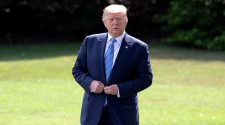Trump did not cause all these crises. But his actions or unwillingness to temper them did deepen the discord in many cases. And his refusal to play the kind of stabilizing leadership role expected of a US president is fomenting power vacuums and may convince key protagonists in each drama that they may not face the kinds of consequences they might normally expect from Washington.
The President’s worldview is rooted in his enduring belief that the world has been ripping America off for generations and that strength and unilateral US action are the only way to restore respect. He believes engagement abroad inevitably leads to costly commitments and bloody disasters like the Iraq War.
But Trump’s foreign policy achievements — apart from piling up glowing flattery by leaders intent on exploiting his craving for praise — are questionable at best. He can claim to have finished an operation started in the Obama administration to stamp out ISIS. And there is a recognition in Washington that China’s economic policies needed to be challenged. But the US and the rest of the world are learning the price of an improvisational approach shaped largely to satisfy Trump’s domestic political requirements that often seems strategized only in the time it takes to commit it to Twitter.
Wednesday’s grim economic news made the risks of such an approach clearer than ever, raising the possibility that Trump’s mission to turn the world upside down could blow up in his face.
Trump worried about economic blowback
Trump’s hopes of four more years in office rest largely on the strength of the US economy.
The fundamentals in the US economy remain strong after a tear of job creation and sustained growth over two presidencies.
But the President for the first time this week hinted that he understands that his big gamble on China may be hurting Americans as well as weakening Beijing’s economy, when he delayed a planned new $150 billion tariff hike.
As bearish sentiment multiplied on Wednesday, however, Trump was not accepting blame but looking for scapegoats.
“China is not our problem, though Hong Kong is not helping. Our problem is with the Fed. Raised too much & too fast. Now too slow to cut….”
But people familiar with the matter told CNN’s Kevin Liptak that Trump worries that a worsening trade standoff with China could weaken the US economy and his hopes of a second term.
Trump warned on ‘pathetic’ response to Hong Kong protests
It is not only on economic matters that America under Trump has ditched approaches on which the rest of the world once relied.
Days of political violence in Hong Kong have underscored how Trump has changed the character of America’s geopolitical role. Almost any other President in recent history would have delivered a robust warning to Beijing not to resort to a violent crackdown against demonstrators demanding the kinds of political freedoms that America has long epitomized.
Yet Trump, who never tires of stressing his strong relationship with China’s Xi, has left the impression that he wouldn’t allow suppression to divert his China policy goals.
Human rights have waxed and waned as an influence on foreign policy for 40 years, but have never been as much as an afterthought as they are for Trump.
Foreign Policy for America, a nonpartisan advocacy organization, accused Trump of trashing America’s essential values.
“Trump’s pathetic statement — apparently an attempt to appease China — is yet another disgraceful example of his bizarre affection for dictators,” the group warned in a statement.
“It would be a big mistake to create a new memory like that in Hong Kong,” said Bolton.
But as always, it is unclear whether Trump’s subordinates, even those supposed to be running foreign policy, speak for the President. Commerce Secretary Wilbur Ross, for example, told CNBC on Wednesday that developments in Hong Kong were an “internal matter” for China.
Some analysts believe that China is unlikely to intervene militarily to quell the uprising, to avoid detracting from the 70th anniversary of Communist Party rule in October.
Yet the intense political pressure Xi is now facing makes it even less likely that he has the political running room to make concessions that Trump is demanding in a trade war that may have existential implications for his own grip on power.
The cost of ignoring diplomacy
Hong Kong is not the only global flashpoint that shows an administration apparently disengaged from developments that threaten a traditional reading of American interests.
The flare-up between Japan and South Korea could undermine the alliance system that that projects US power in Asia.
The conservative Heritage Foundation warned in a new report this month that “the US government has an important role to play in mediating the relationship between Tokyo and Seoul and protecting vital trilateral security coordination.”
But Trump most often speaks of the two US allies when he fulminates against what he sees as their freeloading off US defense guarantees.
And his main concern on the Korean Peninsula is protecting his pen pal relationship with North Korean tyrant Kim Jong Un, which has yielded “very beautiful” letters but made no progress toward ending the isolated state’s nuclear program.
A recent spike in tensions between India and Pakistan, meanwhile, did not stir the kind of panicked US diplomacy spurred by prior confrontations between the enemies for instance in the Clinton administration.
Some analysts have speculated that Trump’s offer to mediate between the two rivals — which appeared to trample the sensitivities of the dispute over Kashmir — during a visit by Pakistani Prime Minister Imran Khan actually precipitated the crisis.
“Someone needs to remind the Potus & sec of state that diplomacy is a tool of national security-and that ignoring it will bring about a world of diminished US influence, greater conflict, less freedom and prosperity, and increased demands on the US military,” Haass tweeted.


















